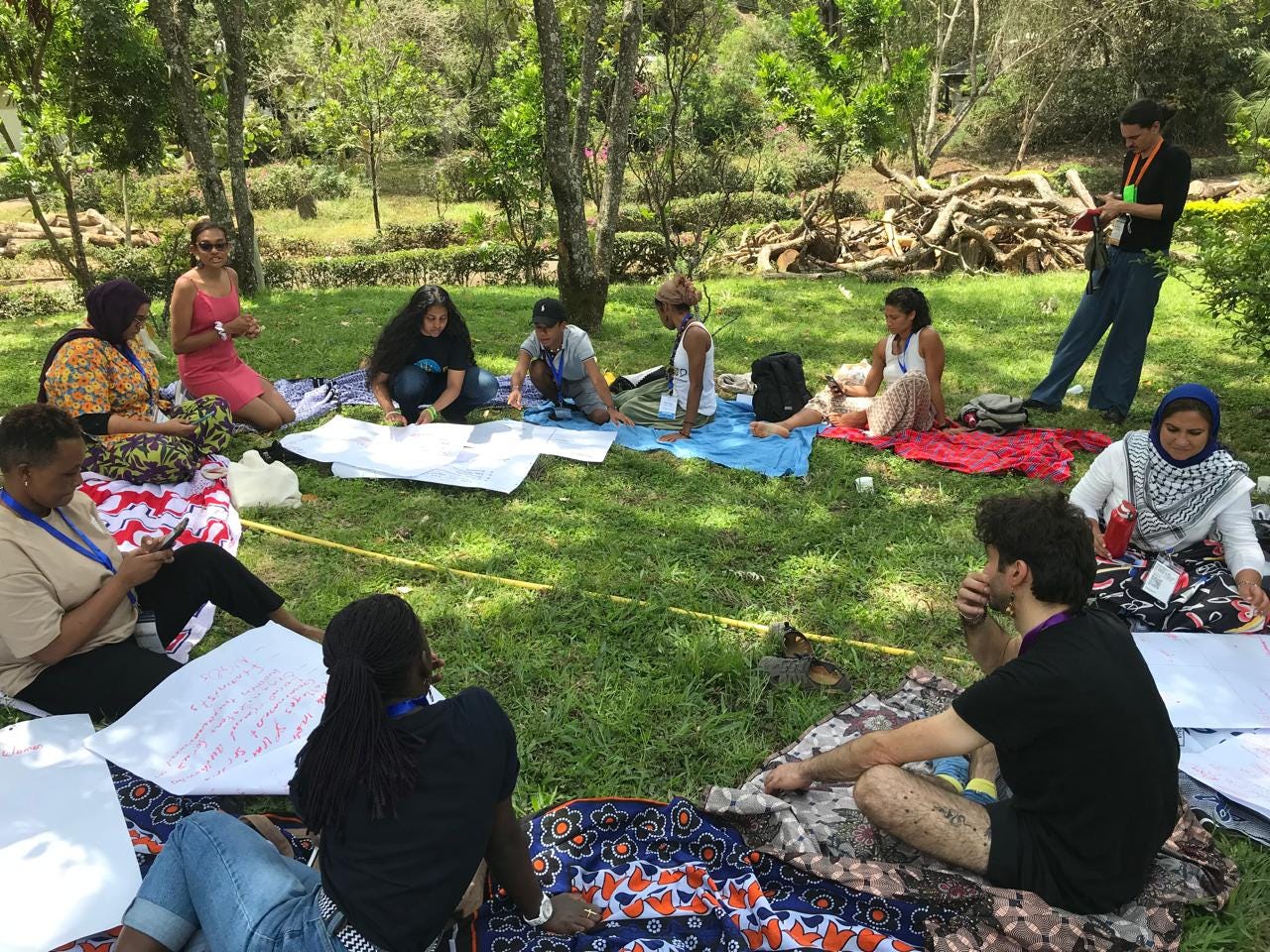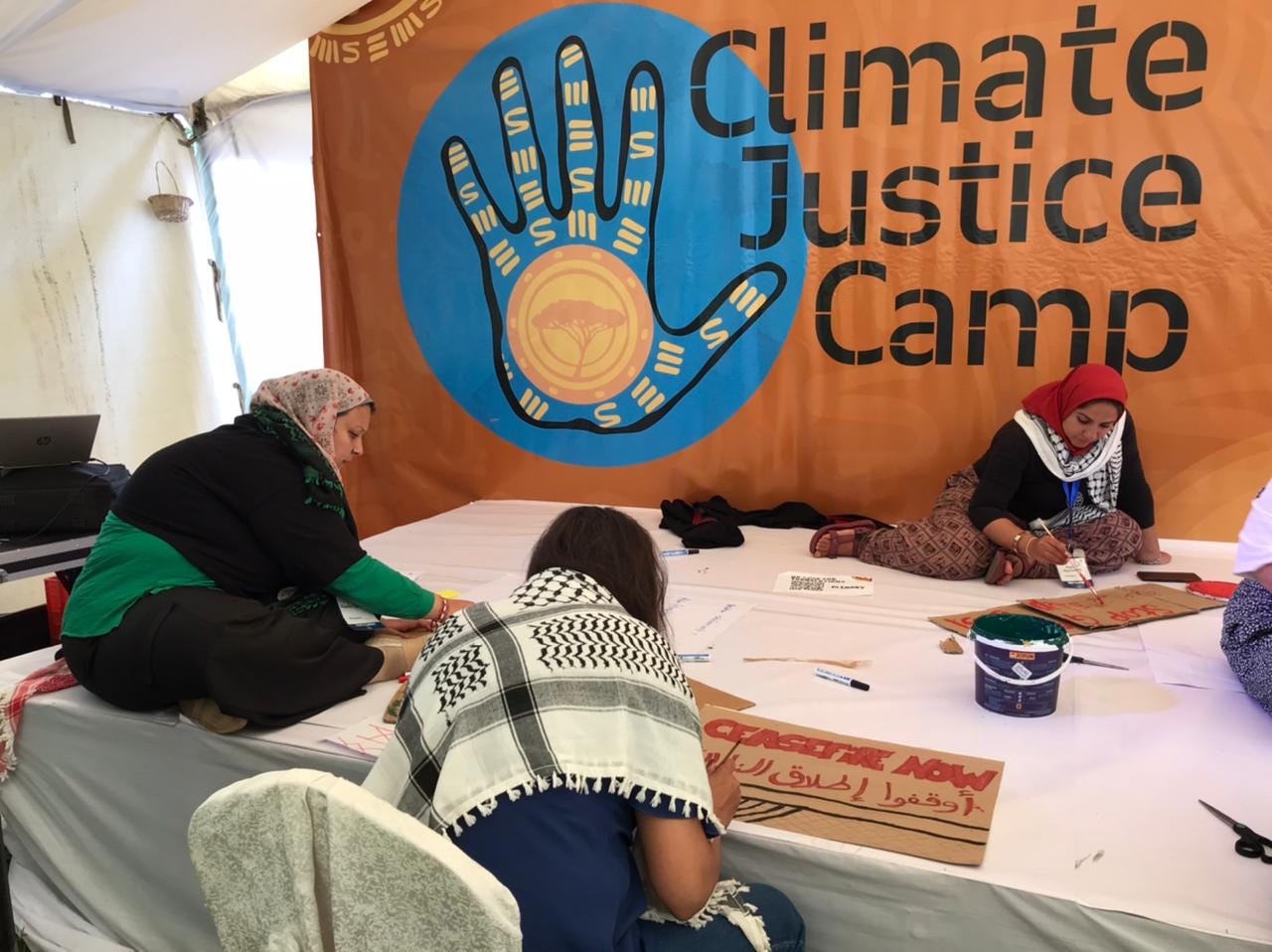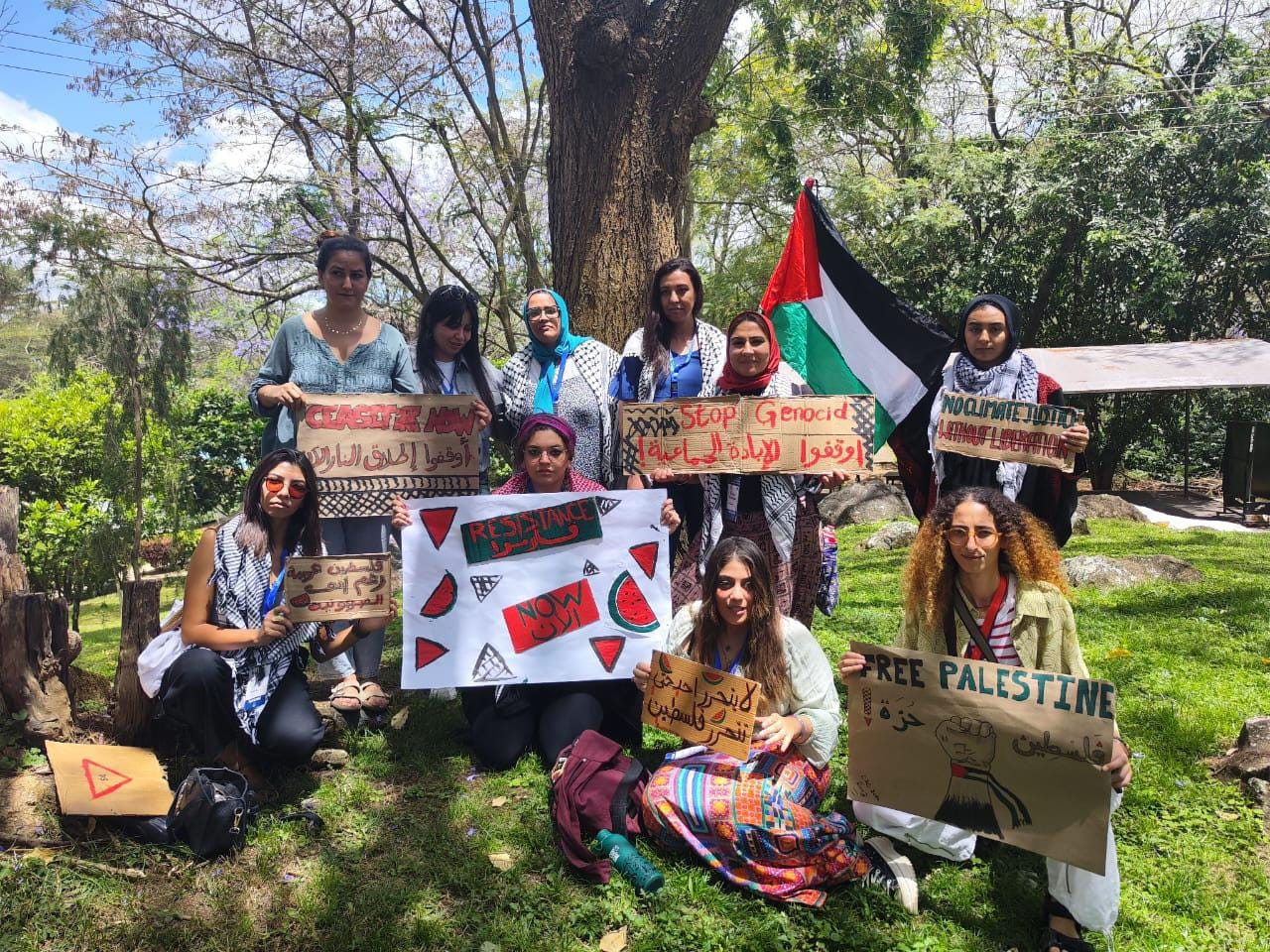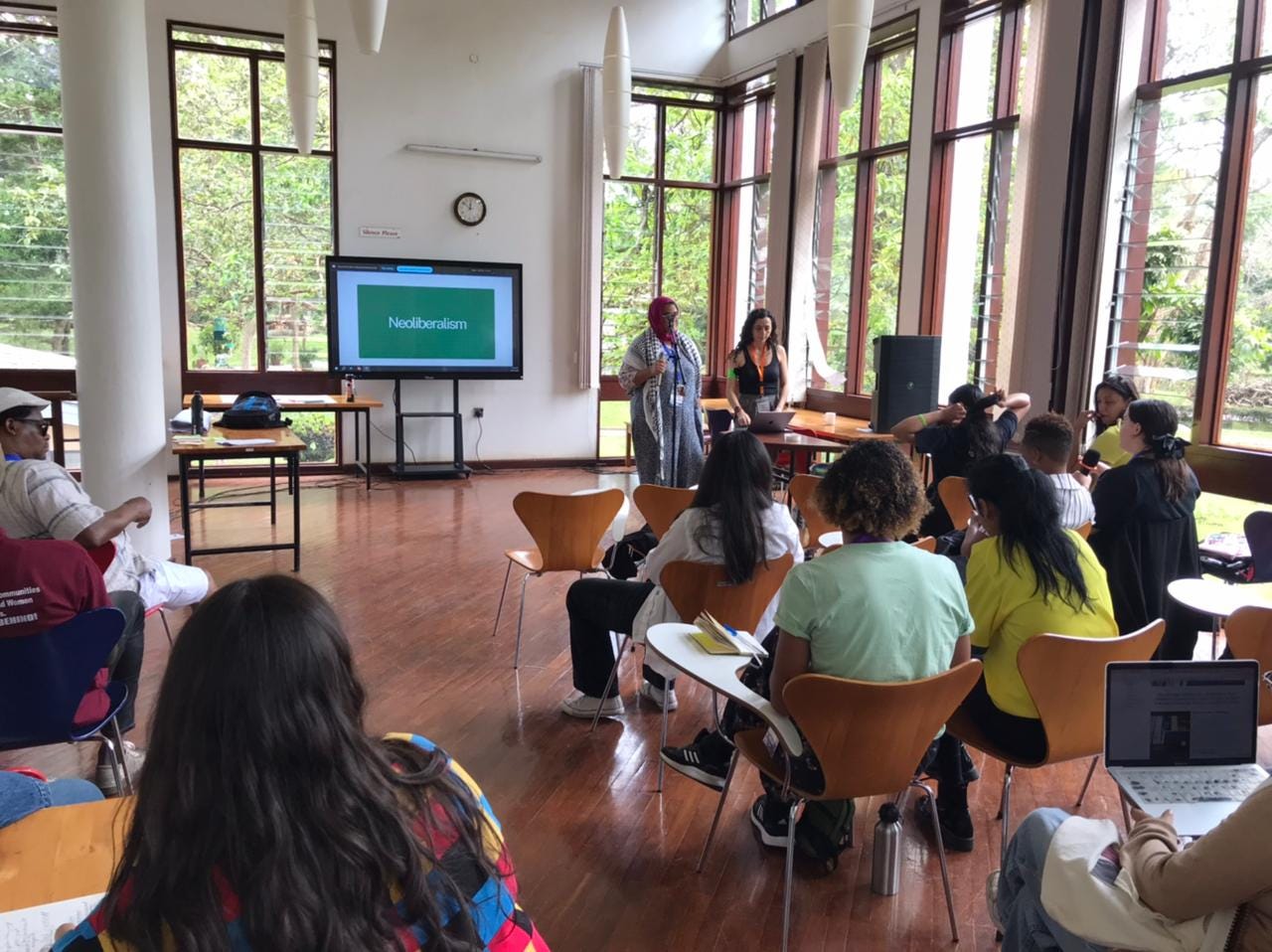SNE Newsletter: November 2024 - Climate Justice Camp & the Latest in Sustainability
3rd of November 2024
A Renewed Sense of Hope
Article by Kenzie Azmi
The past few months, and ultimately the past year, has been by far the most difficult for me, and so many people around me, especially in the climate and environmental movements. It seemed that this space was predominantly not ready to make the needed links between climate change and colonialism.
At the Climate Justice Camp, I was able to regain a small glimmer of hope that young people around the Global South will force the movement and decision makers in the right direction.

Among the singing monkeys and baobab trees of Tanzania, the third edition of the Climate Justice Camp took place between October 8th and 12th. It is an unbranded, collaboratively organized event by 30 partner organizations that build on each year’s experience to continue delivering a much needed space for youth from the Global South to meet and organize. Three hundred youth leaders from 100 different countries came together to be part of a collective movement that aspires to bring about change. At the camp, you are more than just a participant, you can bring your voice to learning and storytelling spaces, represent your affected community, and challenge mainstream ideas.
From our region, the camp included people from Morocco, Egypt, Tunisia, Palestine, Jordan, Iraq and Sudan. Unfortunately our Lebanese colleagues, who hosted us last year during the 2nd edition of the CJC in Lebanon, could not be with us due to the Israeli occupation’s recent destruction of Lebanon, while continuing its genocide on Palestine. Although they could not be with us, we did our best to bring their spirit and voices through the sessions we led, our speeches and a solidarity stand that we organized together on the last day.
I would like to share the words of our colleagues Yara and Tala from the Lebanese organization Public Works: “Let this camp, which brings together youth from all over the countries of the South, be a call for unity in climate action and solidarity in the face of all the actions of colonial powers and regimes that exacerbate environmental degradation and human suffering. Let us name the actions and their perpetrators, and let us first remove colonialism from our minds and fight together to liberate our thoughts and our land, so that we may achieve real climate justice.”
This year’s program focused on six key issues including armed conflict, COP29, energy transition, climate change adaptation, plastic pollution, and the relationship between gender and climate justice. Amongst the sessions run by participants from our region were oil and gas projects and litigation, ecocide, urbicide and genocide in Palestine and Lebanon, air pollution, financial mechanisms to make polluters pay, and an African mask making workshop.
Don’t think it was all so serious, though. It’s a youth camp after all. There were morning walks in the forest for the early risers, an initiatives fair for those wanting to display their sustainable products, an experience in tribal Tanzanian music and dance for the opening, and the traditional cultural fashion show closing ceremony which is a celebration of the rich cultural diversity brought together from all over the world.
At the conclusion of the camp, it was announced that the fourth edition of the Climate Justice Camp will be held in Brazil next year! As COP29 approaches, the voices of these young people will be the driving force behind concrete changes in global climate policy. Participants left the camp with powerful unifying messages, new alliances, but most of all, a renewed sense of hope.
Weekly News Brief SNE
3rd of November 2024
Military Production, Environment Ministers inaugurate banana fiber recycling plant
27th of October 2024
Egypt has launched a factory to produce eco-friendly cardboard packaging from banana fiber waste, a project spearheaded by Egypt’s Minister of Environment, Yasmine Fouad, and the Minister of Military Production, Mohamed Salah El-Din Mustafa. Located at the Armored Vehicles Production and Repair Factory (Military Factory 200), this initiative is a joint effort with Australian company Paperius and aims to reduce plastic use by converting banana waste into sustainable packaging. The project, costing EGP 40 million in its first phase, has a production capacity of 60 million cardboard units annually and provides 110 job opportunities. Additionally, the project targets the local disposal and recycling of Egypt’s banana waste, which would otherwise produce significant greenhouse gases. An upcoming electronic platform will allow investors and private sector companies to explore more green initiatives in Egypt.
Ocean Day: Ocean as the Great Connector
27th of October 2024
At COP 16’s Ocean Day, global leaders and stakeholders gathered to celebrate the ocean’s role in connecting cultures, economies, and ecosystems and to advance the Kunming-Montreal Global Biodiversity Framework (GBF) targets. High-level discussions highlighted the urgency of ocean conservation, including financing for Sustainable Development Goal (SDG) 14, protecting marine biodiversity, and implementing the “30x30” target for marine protected areas. Officials like Inger Andersen (UNEP) and Peter Thomson (UN) underscored the need for balanced sustainable use and conservation efforts. Notably, fishers’ roles in marine biodiversity were emphasized, with speakers calling for greater representation and involvement of fishers in ocean-related policies, as they offer unique insights into sustainable practices through traditional and customary knowledge.
Egypt and the European Union Reinforce Commitment to Green Transition
28th of October 2024
Egypt and the European Union (EU) have signed a EUR 7 million agreement under the European Green Facility initiative to boost Egypt’s sustainable development, with a focus on water sustainability and climate action. This agreement, signed at Cairo Water Week, strengthens Egypt-EU cooperation in the green transition, supporting water-related ministries in Egypt with funds for policy development, governance improvements, and public-private partnerships. Aligned with Egypt’s National Climate Change Strategy 2050 and the Nexus of Water, Food, and Energy (NWFE) national platform, this initiative builds on the strategic partnership announced in March, which includes a larger EUR 7.4 billion funding package to support Egypt’s green initiatives and development agenda.
Green Climate Fund to finance 3 major greening projects in Egypt and globally
28th of October 2024
The Green Climate Fund (GCF) has approved $2.687 billion for climate-resilient projects in Egypt and other Global South countries, including initiatives to strengthen water infrastructure, green financial systems, and support climate-smart agriculture. These projects will address water scarcity, promote sustainable financial practices, and empower small farmers with climate-resilient tools, aligning with Egypt’s Vision 2030 and its efforts to meet Sustainable Development Goals (SDGs) and reduce carbon emissions by 2040.
https://english.ahram.org.eg/News/534211.aspx
“Agrimaster” factory contributes to opening new markets for paper
29th of October 2024
Environment Minister Yasmin Fouad visited the "Agrimaster" paper and cardboard factory in 6th of October City, which recycles paper waste to produce various paper products. Covering 12,000 square meters and with a daily output of 131 tons, the factory utilizes eco-friendly technology to support sustainable economic growth and expand market opportunities for paper products.
https://www.egyptindependent.com/agrimaster-factory-contributes-to-opening-new-markets-for-paper/
Promoting climate-smart agriculture
29th of October 2024
Egypt's agricultural sector is increasingly adopting climate-smart practices to address the severe impacts of climate change, including extreme temperatures, water scarcity, and pest outbreaks that are reducing crop yields and driving up production costs. Farmers are shifting to resilient crop varieties, using advanced irrigation methods, and incorporating organic fertilizers to enhance sustainability. Initiatives led by organizations like the FAO, including Farmer Field Schools, are educating farmers on climate adaptation techniques, and the government is prioritizing water management projects, such as rainwater harvesting and wastewater reuse, to support the sector's resilience and ensure food security amidst escalating climate challenges.
Egypt & Japan strengthen cooperation on suez canal development & sustainability
29th of October 2024
Japanese Ambassador to Egypt, Oka Hiroshi, announced plans for collaboration between the Suez Canal Authority (SCA) and the Japan International Cooperation Agency (JICA) in training and technical studies during a meeting with SCA Chairman Osama Rabie. Hiroshi aims to strengthen ties with the Japanese Shipowners’ Association to enhance transit policies and marketing strategies. Rabie emphasized the SCA's commitment to supporting maritime needs through new services and highlighted progress towards the Green Canal by 2030 initiative, which includes waste removal services and renewable energy conversions. He expressed optimism about advancing Egypt-Japan relations through collaborative projects focused on investment, training, and sustainable development.
How harmful are microplastics to human health?
30st of October 2024
Microplastics, tiny plastic particles found throughout the human body, are becoming a growing health concern as research suggests links to various diseases. Detected in lungs, blood, and even brains, microplastics are present globally—from oceans to mountains—and are ingested, inhaled, or absorbed by humans daily. While studies, such as one in *The New England Journal of Medicine*, associate microplastics with risks like heart attacks, cancer, and fertility issues, conclusive evidence on their direct impact remains limited. Scientists warn of potential “Trojan Horse” effects, where microplastics may carry harmful contaminants. As plastic production continues to rise, experts recommend minimizing exposure by avoiding plastics in food storage and opting for natural materials.
https://english.alarabiya.net/features/2024/10/30/how-harmful-are-microplastics-to-human-health
Egypt made notable strides in achieving Global Biodiversity Framework goals: Environment minister at COP16
30st of October 2024
At Colombia's COP16 Conference on the Global Biodiversity Framework, Egyptian Environment Minister Yasmine Fouad, representing President Abdel-Fattah El-Sisi, highlighted Egypt's significant progress towards achieving biodiversity goals. She emphasized the country’s updated national biodiversity plans focusing on ecosystem restoration, sustainable agriculture, and expanding protected areas, including the declaration of the Red Sea's Great Fringing Reef as a protected area. Fouad underscored Egypt's integration of nature-based solutions (NBS) into its biodiversity strategy, contributing to climate change mitigation. She also called for increased financial support to meet ambitious targets set by the Global Biodiversity Framework and reiterated Egypt’s leadership in regional conservation efforts and initiatives like ENACT, which integrates biodiversity into climate agendas.
Greenpeace Publishes Taiwan’s First Systematic Research on Plastic Nurdle Pollution
30st of October 2024
The fifth round of negotiations for the Global Plastics Treaty (GPT) will be held in Busan, South Korea, focusing on regulating plastic production to combat global pollution. In support of these efforts, Greenpeace's Rainbow Warrior is conducting research in Taiwan, revealing significant contamination of beaches near the Linyuan Petrochemical Industrial Park with plastic nurdles, small pellets used in manufacturing. Greenpeace has called for stricter regulations on the petrochemical industry and a global target to reduce plastic production by 75% by 2040, highlighting the urgent need for collective action against plastic pollution.
Qalyubia Governorate calls for urgent action over Arab Al-Aliqat landfill
30st of October 2024
A high-level committee has been established in Qalyubia Governorate, in collaboration with the ministries of Health and Environment, to investigate the sanitary landfill in Arab al-Aliqat following a tragic incident that resulted in the deaths of three individuals and injuries to six others. The victims, who were collecting garbage at the landfill, became ill after being exposed to an unknown substance in plastic barrels. Despite being taken to a hospital for treatment, they did not survive. This incident has reignited concerns about the landfill's safety; the Governor had previously decided in 2013 to relocate the facility due to community pressure.
Manal Awad says Egypt committed to facing climate challenges
31st of October 2024
At the World Cities Day conference on October 31, 2024, Local Development Minister Manal Awad reaffirmed Egypt's dedication to tackling climate challenges and promoting regional and international cooperation for sustainable development goals. She emphasized that hosting the conference demonstrates the Mediterranean city's capability to address environmental issues. Awad highlighted the ministry's critical role in implementing strategies for urban sustainability, collaborating with international development partners and the private sector, and focusing on sustainable clean transport projects to reduce carbon emissions.
2024 United Nations Biodiversity Conference
16th of October - 1st of November 2024
The 2022 Kunming-Montreal Global Biodiversity Framework (GBF) emphasizes the critical role of biodiversity for human well-being, environmental health, and economic prosperity, yet biodiversity loss continues to pose a significant threat to life on Earth. The GBF aims to reverse this trend by addressing both direct and indirect causes of biodiversity loss, focusing on conservation, sustainable use, and equitable benefit-sharing from genetic resources. The upcoming 2024 UN Biodiversity Conference, themed "Peace with Nature," will be the first since the GBF's adoption and will involve key discussions, including the implementation status of the GBF, establishment of a multilateral mechanism for benefit-sharing from digital sequence information, and the alignment of national biodiversity strategies with the framework. The conference will take place from October 21 to November 1, 2024, in Cali, Colombia, preceded by the fifth meeting of the Subsidiary Body on Implementation.
https://enb.iisd.org/un-biodiversity-conference-cbd-cop16
What Will Happen at COP 29?
1st of November 2024
Jennifer Bansard of the Earth Negotiations Bulletin highlights key priorities for COP 29, including the new collective quantified goal (NCQG) for climate finance, which aims to rebuild trust among developing nations following unmet previous commitments. The conference will also address climate change mitigation strategies, particularly the transition away from fossil fuels, and assess progress on loss and damage mechanisms. Amidst a challenging geopolitical landscape, Bansard emphasizes the need for countries to present more ambitious nationally determined contributions (NDCs) ahead of the 2025 deadline, while acknowledging the broader environmental agenda that overlaps with this year's negotiations.
https://www.iisd.org/articles/explainer/what-will-happen-cop-29
Egypt among earliest countries to adopt NbS in 7 governorates
1st of November 2024
Minister of Environment Yasmine Fouad announced that Egypt is a pioneer in implementing nature-based solutions (NbS) across seven governorates in the North Coast and Nile Delta. Speaking at the UN Biodiversity Conference (COP16), she highlighted a new discussion paper from the global ENACT Partnership, which proposes three policy measures to effectively tackle the interrelated issues of climate change, biodiversity loss, and land degradation through NbS. Fouad noted that this year has been significant for the NbS initiative, expanding its reach and partnerships since its launch during COP27 in Sharm el Sheikh, with further advancements marked at COP28 and the recent United Nations Environment Assembly (UNEA-6).
Malaysia struggles to halt European plastic waste imports
2nd of November 2024
Despite pledges to curb plastic waste imports, Malaysia remains the second-largest importer of plastic waste from the EU, with imports rising 35% last year. The EU exported 8.5 million tons of waste in 2023, and over 20% ended up in Malaysia. While the EU plans to ban plastic waste exports to non-OECD countries by mid-2026, critics argue that the EU's current export practices are harmful and unethical, with substantial increases in shipments to Asia. Environmentalists highlight that much of the imported plastic is nonrecyclable or contaminated, contributing to landfill and incineration issues. There are calls for improved regulation and enforcement in both Malaysia and the EU to combat illegal waste trade and enhance waste management practices.
https://www.dw.com/en/malaysia-struggles-to-halt-plastic-waste-imports-from-europe/a-70638812
Upcoming Events:
World Urban Forum, 4–8 November 2024, Cairo, Egypt, More Info
40th UN-Water Meeting, 4–5 November 2024, New York, USA, More Info
Cities Leading the Way: Combatting Plastic Pollution for a Sustainable and Circular Future, 6 November 2024, Cairo, Egypt, More Info
African Energy Week, 4-8 November 2024, Cape Town, South Africa, More Info
Renewable Energy Forum Africa, 6-7 November 2024, Tunis, Tunisia, More Info
UN Climate Change Conference Baku - November 2024, 11-22 November 2024, Baku, Azerbaijan, More Info






